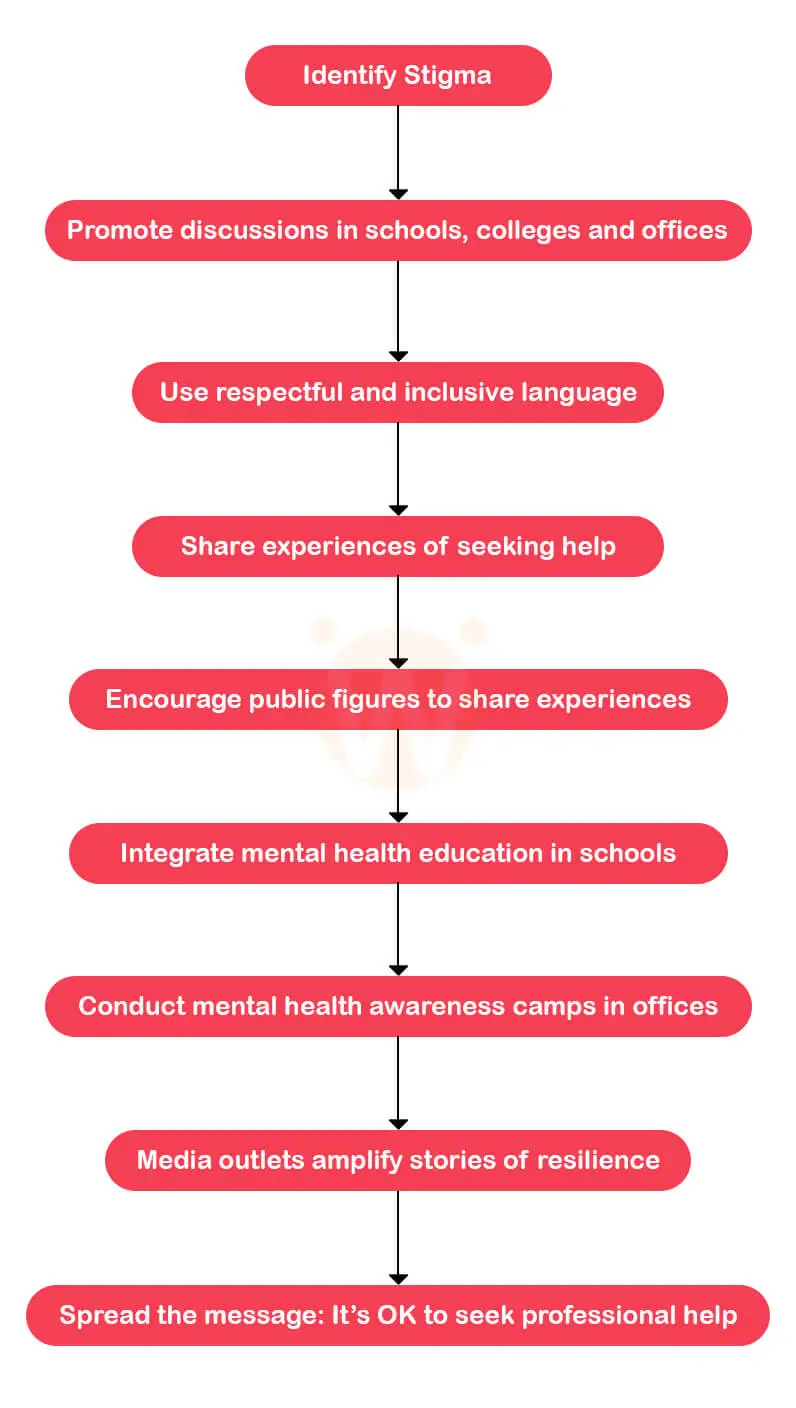Prioritizing Mental health: Breaking the chains of Stigma
By Wellness Hub
Last Updated: October 17, 2023
In a world that values physical health above everything else, the importance of prioritizing mental health cannot be overstated. Taking care of mental health is not a luxury, but a necessity. Our mind holds our whole world of emotions, thoughts, ideas, knowledge, actions, and whatnot! Hence, it is evident that good mental health is crucial for our overall well-being. Yet, one in eight individuals globally, is suffering from some mental health issue, as per the World Health Organization. Unfortunately, the pervasive social stigma around mental health concerns, makes people hesitate to talk or seek help openly about any kind of mental health issues.
Any human being can be able to think and work efficiently when he is perfectly healthy. Being healthy doesn’t mean just being physically healthy, but mentally too. Sound mental health is very important for overall human development. We can’t put a price on money and health. Many people in today’s society are not aware of mental health, and because of this unhealthy coping mechanisms are being encouraged unknowingly. Especially the youth has been getting addicted to bad habits and drugs that spoil their precious life. Others commit suicide due to the pressures of a dysfunctional life. Balancing life’s challenges is highly getting affected.
Social Stigma – The Demon!
According to World Health Organization (WHO) statistics, one in eight people suffer from mental health problems. Unfortunately, for many of these people, addressing their mental health has become a problem because of the social stigma.
How to reduce the Stigma?

The fear of judgment and societal misconceptions surrounding mental health, often lead people to suffer in silence. The stigma around mental health issues has been so deeply rooted in our society which needs many changes to be implemented to bring about a shift in the thinking of the people. This fosters an environment where individuals feel safe and supported in seeking help when needed.
Some of those steps can be such as
- Promoting discussions and open conversations about mental health in schools, colleges, and office settings can help normalize the way we look at it.
- The language we use makes a powerful impact. We need to destigmatize the language related to mental health by using respectful and inclusive language in addressing mental health issues.
- When individuals share their experiences of taking support from mental health professionals, it humanizes the struggles making it easier for others to relate and empathize. Conducting such open talks helps a lot.
- In recent years, there has been a notable increase in the number of celebrities and public figures sharing their experiences about mental health concerns. Having such discussions can encourage people to open up.
- In schools, integrating mental health education into their curriculum can be transformative. Teaching the students about emotional well-being, coping mechanisms, and the importance of seeking help can empower a generation.
- Conducting mental health awareness camps and initiatives in offices helps employees manage their stress levels. Many corporate offices are supporting the mental well-being of their employees through counseling services and workshops to increase employee engagement.
- Media outlets can be impactful in destigmatizing mental health issues. Media can play a positive role by amplifying stories of resilience, recovery, and diversity of mental health experiences.
As famously said, it is okay, to be not okay. It is human to experience emotions and when these emotions get imbalanced, get in the way of our daily life, and take a toll on our mental health, it is essential to seek help from a professional.
What Statistics Say?
According to the World Health Organization (WHO), more than 100 million people are currently suffering from various mental disorders worldwide! Most of them suffer from anxiety and depression. After the rise of the Corona epidemic, those suffering from anxiety increased by 26 percent and those suffering from depression by 28 percent. The other four crore people suffer from bipolar disorder and another 2.4 crore suffer from delusions/psychosis (schizophrenia). Many studies have shown that the life expectancy of these victims is reduced by 10-20 years due to lack of proper treatment. Around four crore children and adolescents worldwide suffer from behavior and discipline-related problems. The National Institute of Psychiatry and Neurosciences (NIMHANS) in Bangalore has revealed that although mental health care services are adequate for 15 crore people in India, only three crore people consult a professional.
India is yet to change!
India needs to implement many strategies for improving the mental health of its citizens. Around 20 percent of the youth around the world are suffering from various mental problems and loneliness. Studies say that Suicide is the fourth leading cause of death among 15-29-year-olds. Although psychologists in India offer effective treatments at low cost, they are available to very few people. In many remote areas, the mentally ill suffer from discrimination, violation of rights, and untouchability. On the one hand, due to lack of treatment, on the other hand, the living standards of mental patients are falling significantly due to the social and economic problems of the country. Problems like mental retardation, autism (ASD), and hyperactivity (ADHD) arise due to lack of brain development in children. Speech therapy, behavioral therapy, and occupational therapy should be given when such problems are identified, at an early stage.
Exposure to unfavorable conditions like extreme poverty, frequent fights, drug abuse, and criminal tendencies can lead to mental health problems in adults. There is a need to create awareness among people in tackling these issues. Along with them, many other external influences like geo-political issues, wars, pandemics, inequality, and environmental factors can also affect our mental health.
What needs to be done?
Many programs are being implemented in our country to protect the mental health of people. With the intention of providing these health services to all, the ‘National Mental Health Programme‘ was taken up in 1992. After that, a mental health program was started at the district level in 1996, especially for rural people. For the comprehensive health of the youth, the Rashtriya Kishore Swasthya Karya was brought up. Ely-HWC is widely established to offer mental health counseling services at the basic level.
Many suffer from mental problems but do not consult doctors. Only one-third of depression sufferers receive treatment. Therefore, there is a need to increase awareness of mental health in the country and make counseling available to all sufferers. In particular, psychiatrists and staff should be fully recruited and counseling facilities should be improved. Advanced treatments should be made available along with increased emphasis on research. We cannot underrate the importance of keeping track of its health and taking the support of a professional when necessary.
“Wellness” for All
Wellness Hub extends its roots in strengthening the mental health of individuals by offering counseling services through both offline and online modes. Psychologists who are experienced, empathetic, and non-judgmental provide counseling and therapeutic support through secured means of communication. Our counseling services extend from children to all ages of men and women. We offer counseling services for Relationship counseling, Marital counseling, Child parenting counseling, Counselling for Anxiety, stress, Depression, and many other emotional issues.
Besides providing mental health care to children with academic difficulties, Wellness Hub offers therapeutic treatment to children suffering from Autism Spectrum Disorders, ADHD (Attention Deficit Hyperactivity Disorder), Down syndrome, Cerebral Palsy, Speech, and language-related issues, social communication problems, motor difficulties, sensory difficulties, and other developmental delays. Though research studies are still going on to find out the underlying causes of these neuro-divergent conditions in children, it is essential to act as early as possible when these issues are identified. Early intervention always helps.
Book your Free Consultation Today
Parent/Caregiver Info:
Client’s Details:
* Error Message









